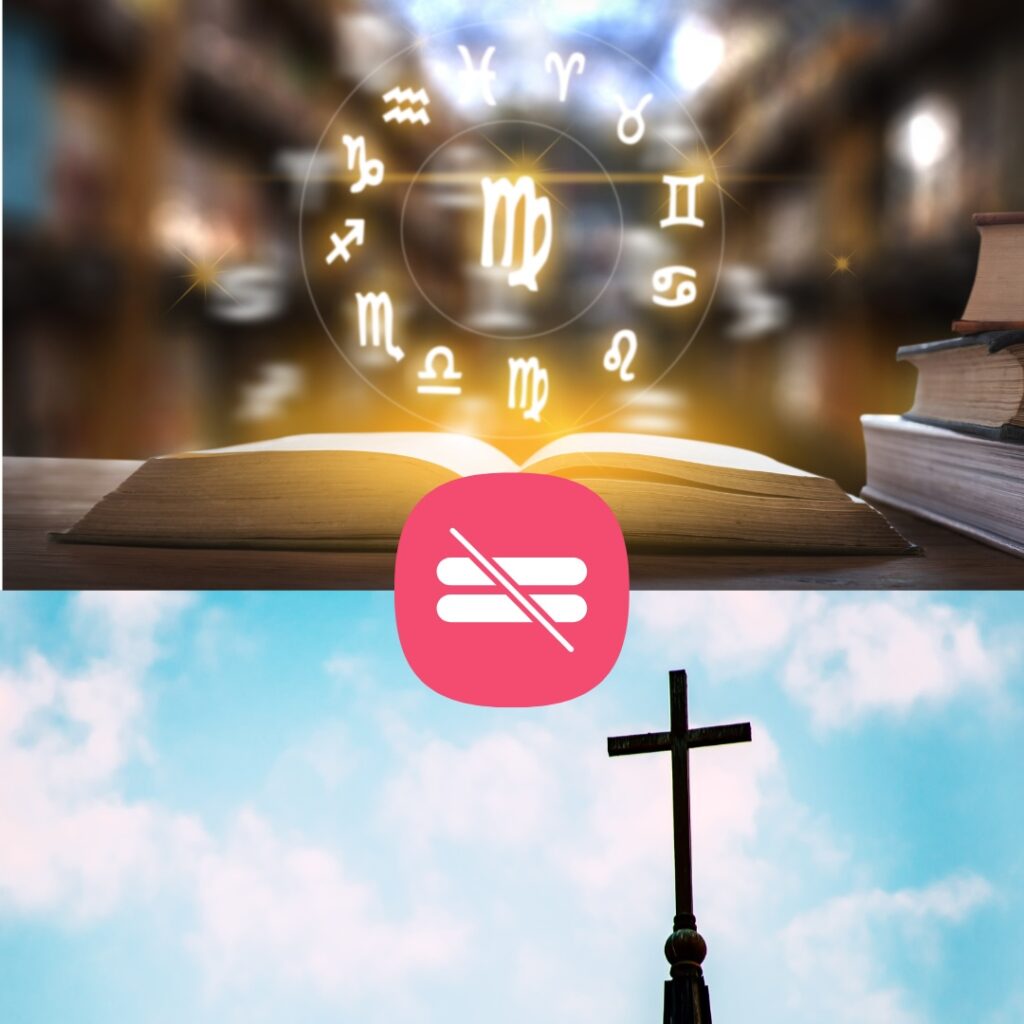Disclaimer: This article is NOT to shame anyone who chooses to practice organized religion that has their reservations about astrology. This article is merely to inform and enlighten those who are curious about astrology but concerned about whether it’s practices hinge upon their faith or not.
Table of Contents
The Complicated History of Astrology & Religion
Astrology has captivated human curiosity since the dawn of time. It is a practice that many use to understand their individual personalities, prepare for future events, and make sense of their past.
While some forms of spiritual practices utilize astrology in their work may resemble those of organized religion, it’s important to clarify why astrology is not, in fact, a religion. Many people throughout centuries have been quick to judge and dismiss astrology as a whole due to the mishandling of information thrown out in pop astrology and passing judgment of character onto others’ bad traits based on their zodiac sign (read my previous article where I talk about how everyone has more than just 1 zodiac sign). There seems to be a abhorrent dislike of astrological practices amongst those who identify with a strict organized religion, especially Christianity.
The fact is, astrology is in NO WAY tied to needing to abandon one or the other due to a clash of truths.

For decades, rumors have spread freely about the practice being “ungodly” and facts have been twisted to align with the narratives of religious leaders. This misunderstanding however is rooted in the improper calculations made by astrologers in 1800s who worked with the Catholic Church to help them make predictions about future events (yes, you read that right; the church DID use to practice astrology).
Unfortunately, these calculations made the church turn it’s back on astrology for good, leading it’s leaders and generations after them to tarnish it’s name and villainize it as a structure of belief that goes against the word of God.
Though that last section focused specifically on Christianity’s history with astrology, we will be discussing the distinction between astrology and ALL religions. I just know from my own experience, growing up in a Christian family and belonging to social groups where the majority identified as Christians, that astrology was frowned upon and not accepted as an appropriate line of study. I’m sure that other religious practice hold it’s biases toward astrological practices, but I can only speak on what religion I was raised around.
It is my hope that this article can clear up some confusion surrounding the distinction between religion and astrology and it’s information as a stepping stone toward de-stigmatizing the negative rep astrology has gained from various religious communities.
Astrology, when used correctly, is truly a wonderful tool to help those who are feeling stagnant, lost, and hurt find spiritual peace and healing that doesn’t require an internal philosophical war between who is right and who is wrong. Keep reading to find out why astrology is not a religion.
Purpose and Function
Religion and astrology serve different purposes in society. Religion offers a framework for understanding the meaning of life, the existence of a higher power, and moral codes to be conducted by individuals and communities. It involves worship, rituals, sacred texts, and a belief in a deity or deities who guide or control the universe.
Astrology, on the other hand, is a system that interprets the positions and movements of celestial bodies (stars and planets) to provide insights into natural human tendencies and natural occurring worldly phenomena. It involves divination and personal insights and not the worship or moral guidance that religion purports. Astrology does uphold a cohesive worldview or code of ethics that is found in organized religion.
Unified Belief Systems Vs. Non Unified Belief Systems
Religions are often characterized by a core set of beliefs and principles that its followers are expected to strictly adhere to. They typically involve the nature of god or deity worshiping, the existence of an afterlife, and teachings of morality. Religion has a very strong communal aspect, with followers sharing these same beliefs engage in collective worship and rituals.
Astrology does not have a unified belief system. Though astrologers can share common methods or principles regarding the practice, there is not a single belief system that all practitioners and students of astrology must follow. The interpretations of astrological studies are highly individualistic and widely vary among professional astrologers. Additionally, astrology does not require a belief in a higher power, thus making it a metaphysical practice.
Structure and Organization
Organized religion usually has an organized structure. These include places of worship and an established hierarchy that guides and oversees how the religion is practiced among it’s followers. Most have sacred texts that are considered a holy authority on acts of faith.
Astrology does not have a formalized structure. Even with astrological schools of thought and professionally practicing astrologers, there is no main authority or institution that governs how astrology should and should not be practiced. There are no sacred texts, but there are important historical written works that have influenced how humans have practiced astrology over the centuries.
Roles in Cultures and Society
Religion often plays a significant role in shaping societal and cultural norms. There is a specific focus on community building, identity shaping, and moral direction. The structure of religion has long influenced laws, customs, and social behavior. Religions also include traditions of celebration to mark births, deaths, and marriages.

Astrology’s role in society and culture is more individualistic. While it can influence personal decisions and outlooks, it does not typically shape social structures or cultural norms in the same way that religion does. Astrology is a study that many use as a tool for spiritual guidance, but it does not provide the communal or moral framework that of an organized religion.
Sacred Truth vs. Interpretation
Religions of faith call upon believers to accept spiritual truths that may not be empirically verifiable. The spiritual truths found in religious practices often involves a relationship with a higher power, trust in it’s sacred teachings, and a commitment to a certain way(s) of life.
Astrology, by contrast, is an interpretative practice that calls upon the inner knowing of it’s students and their individual level of knowledge about the study. It relies on the positions of celestial bodies at specific times, which those who practice it interpret to provide intuitive insights about themselves and others.

Many people solid beliefs in astrology, but it does not require the kind of steadfast faith seen religion. Instead, it operates more on symbolism and correlation and doesn’t invoke a divine power or supernatural phenomena the way religion does.
Conclusion
Astrology and religion may seem similar on the surface. Both such offering a sense of comfort, personal guidance, or meaning, they are fundamentally different. Astrology is a tool for spiritual enrichment and self-reflection. There is no set of structured beliefs, community practices, or conducts of morality that is found in religion.
Understanding this distinction helps clarify the role astrology plays in the lives of individuals who chose to study it, in contrast to the broader, more communal, faith-based role religion plays in society as a whole.